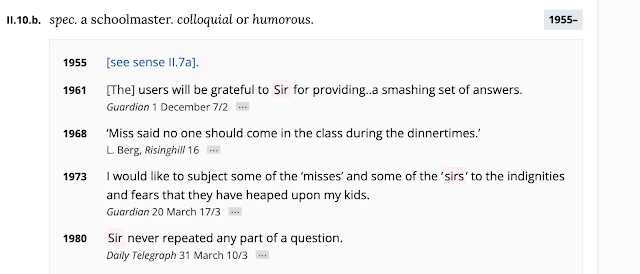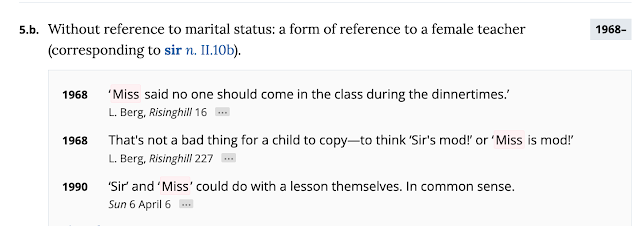This is one of those posts where I'm going to let someone else do most of the writing. I got this message from Justin a couple of weeks ago:
I’m from Malaysia, where BrE dominates in schools but AmE is
prominent in pop culture (so too CanE and AusE). I was British educated
there, before moving to the UK for boarding school and my undergrad. So
I’d like to think of myself as pretty much a BrE speaker.
My
girlfriend is American. A born-and-bred Wisconsinite. I’m currently
living with her in Illinois as I pursue my Masters. This is partly the
reason we so enjoy your blog, as it has helped clear up a number of
differences we’ve come across.
One difference
that gets me every time is the use of the word sure as an affirmative.
When I use sure as an agreement, it is usually in response to a
suggestion. I feel I am deferring to that suggestion, as if I am saying
‘I’ll go along with what is invariably your point’.
My
girlfriend, however, uses sure as a simple ‘yes’ - whether or not it
is in response to suggestion or a more general yes/no question.
So a typical interaction might go:
GF: ‘I’m feeling like having Chinese food tonight.’
*time passes*
Me: ‘So do you still want to have Chinese food tonight?’
GF: ‘Sure.’
To
her, she is just saying 'yes' to the question. But, no matter how much I
am reminded of her usage of the word, I am still thrown off every time
because it seems as if she has turned her own suggestion into mine. It
feels as if she’s deferring the responsibility of the suggestion to me. I
don’t mean to say that I accuse her of this - she knows how this throws
me, and we laugh about it - that's just my gut reaction based on my own
usage of the word.
So my question - and I do
apologise for the wall of text - is whether this is a BrE / AmE
difference? What scant sources I can find online - due to all the
context I need to unload before asking the question - seem to hint this.
However, could it be that my own usage of the word is limited through
my strange background? Is this a uniquely Midwestern AmE trait (my
girlfriend’s family all so seem to use ‘sure’ in this way)? Or is it a
case-by-case notion, where one’s personal circumstances lead to one
usage or the other?
I have to thank Justin for typing that all out because it is a scenario that plays out in my house on a weekly basis. Spouse suggests something to do, somewhere to go, something to eat, and I say
Sure and he (at this point, one feels, just to be difficult, because we've been through this many times) says "That means
no, then."
I don't think it's just Midwestern. I've lived in the Midwest, New England, Texas, and upstate New York, and my
Sures never caused a discernible problem till I moved to England.
This a hard thing to look up in a (orig. AmE)
run-of-the-mill corpus, because so much about a
Sure depends on how it's said. There are 198
Yea(h), sure in the AmE part of
the GloWBE corpus and 91 in the British, but that's an internet corpus, not spoken interaction, and it's far more likely there that the
Yeah, sure is a sarcastic expression of doubt than a casual agreement to a suggestion. While I have access to some corpora with spoken language, they're pretty bad for this kind of thing (as I discovered when I tried to use them to study
please). The transcripts in those corpora are overloaded with people having conversations about topics, but in real life we spend much less time debating the issues of the day or recounting a childhood memory and more on negotiations about what to eat or veiled accusations that the dishwasher has been loaded wrong.
There are some discussions of affirmative
sure online, often from English learners who have noted it as something Americans do.
This Huffington Post blog has a Connecticut mother of (orig. AmE)
teenagers (so, probably close to my age) noting that
people are now taking her
sures as unenthusiastic. But her
sures were delivered by text or social media, so the intonations weren't available for the readers to hear--making it a riskier place to use
sure. So was it the medium, or do younger Americans use
sure less? The trend might be
toward(s) more exaggerated responses needed to show enthusiasm--e.g.
great,
awesome, or the less (BrE)
OTT cool. And we might be pretty far down the road of that trend.
(I've done a brief search for academic papers on
sure, but had no luck finding much on this affirmative usage. If anyone knows of any, please let me know.)
In our house, as in Justin's relationship,
sure miscommunications remain a problem we're aware of, but haven't managed to fix. The spouse thinks I should say something else, while I wonder why he can't just mentally translate it when he hears it from me, as he would for any other Americanism that slips out. If it sounds unenthusiastic, can't an Englishman just interpret it as a case of
understatement (
which Brits seem so eager to claim for their own)?
But
sure is harder than a problem like
sidewalk/pavement or
tomayto/tomahto, since it's not a referential word (one that stands for things in the world), but more context- and relationship-dependent. The differences are less obvious and the usage/interpretation is more automatic. We're creatures of our own gut-reactions.
















